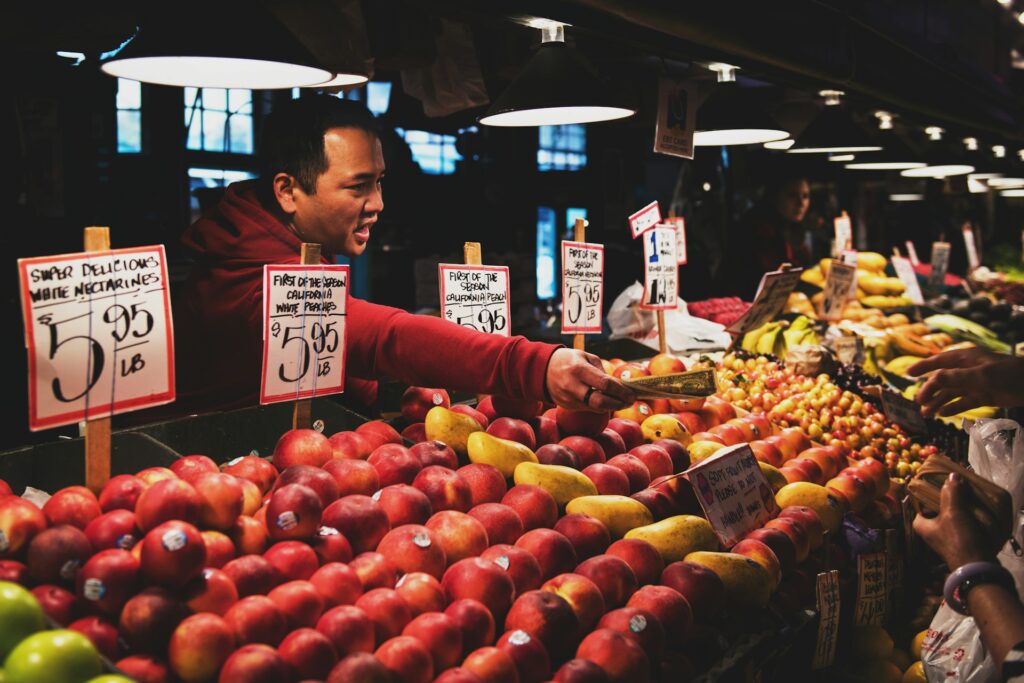While agrifood systems activities substantially benefit society, they adversely impact economic, social and environmental sustainability. Thus, all agrifood system actors, from producers and agribusinesses to consumers and governments, have an important role in developing strategic actions tackling intertwined challenges of food security, poverty, and climate change.
Unveiling the true cost of our food

Photo by Tim Mossholder on Unsplash
This year, the State of Food and Agriculture (SOFA) focuses on the value-driven transformation of agrifood systems, building on the 2023 findings and, exploring true cost accounting assessments and identifying policy interventions seeking transformation.
The new report reaffirms earlier estimates of the hidden costs linked to agrifood systems and offers a comprehensive analysis of the costs related to unhealthy diets and non-communicable diseases across 156 countries.
“The true cost of our food goes far beyond the price we pay at the store” – Andrea Cattaneo (Senior economist and editor of the SOFA report at the Agrifood economic and policy division).
What are the levers for fostering agrifood systems transformation?
Identifying hidden costs and benefits in agrifood systems
Agrifood systems are the backbone of global economies and food security, providing essential goods that sustain billions of people. However, their economic, social, and environmental impacts often remain concealed, with hidden costs totalling $12 trillion annually. This reveals the inefficiencies and inequities within these systems:
- Approximately 70% of these costs arise from unhealthy diets, leading to non-communicable diseases such as obesity, diabetes, and cardiovascular diseases. This underscores the urgent need for healthier food systems that prioritise nutritional quality and accessibility.
- Another significant cost stems from environmental damage, including deforestation, soil degradation, water pollution, and greenhouse gas emissions from agriculture.
- Hidden costs also include labour exploitation, gender disparities, and unequal distribution of food resources, exacerbating poverty and social injustice.
The report emphasised the transformative potential of true cost accounting (TCA) in reshaping agrifood systems. By quantifying hidden costs and benefits, TCA provides policymakers and stakeholders with a clearer picture of the real value of agriculture.
The FAO calls, using this approach, for a shift from focusing solely on maximising production to prioritising the overall societal value of agrifood systems. TCA emerges as an essential tool for creating equitable, efficient, and sustainable food systems worldwide.
Challenges and opportunities in system transformation
The report identifies critical challenges impeding the transformation of agrifood systems toward sustainability.
- Agrifood systems vary significantly across regions, requiring tailored transformation strategies. For instance, protracted crisis systems face severe social and environmental costs, while industrial systems grapple with dietary risks and health costs.
- Power imbalances allow larger actors to externalise costs, burdening smallholder farmers and local communities.
- Hidden costs, ranging from immediate local effects (e.g. water shortages) and long-term global impacts (e.g. greenhouse gas emissions), create unified policy responses.
- The global shift toward processed foods has exacerbated health issues.
- Many agricultural subsidies support practices like monoculture farming, further increasing hidden costs.
The report also outlines key opportunities for transformation.
- Data-driven interventions, such as TCA, can help policymakers identify areas for reform by quantifying hidden costs and benefits.
- Investing in agroecological practices offers a way to reduce environmental degradation while improving yields and resilience.
- Empowering consumers through transparent information and nutrition education can foster sustainable and healthier food choices, driving demand for low-impact products.
- Fostering collaboration between government, private sector, and civil society can create synergies to scale sustainable practices.
The FAO underscores the importance of equitable approaches, ensuring that the costs and benefits of transformation are fairly distributed among small-scale producers and low-income consumers.
Strategies and recommendations for future agrifood system resilience
According to the report, transforming agrifood systems requires systemic strategies, targeted policy recommendations and stakeholder engagement.
It emphasises boosting the consumption of plant-based whole foods while reducing reliance on processed foods to lower health costs. Tailored strategies to regional contexts and sustainable food sourcing can effectively address local challenges, reshape food environments and influence consumer behaviour.
Policy recommendations are vital. Redirecting subsidies from environmentally damaging practices to sustainable agriculture, strengthening social safety nets, and promoting sustainable supply chains through certification and traceability systems are also cornerstones for fostering transparency and accountability.
Engaging stakeholders is also crucial to success. Empowering farmers with resources, financing, and education fosters sustainable practices, while awareness campaigns and incentives can shift consumer behaviour toward sustainability. At the same time, corporations must integrate sustainability into their operations, using Environmental, Social, and Governance metrics and partnerships with governments, international organisations, and private entities to scale solutions and address holistic challenges.
To ensure a healthier future for people and the planet, the report highlights the need to address the distributional imbalances between those who benefit from the current system and those who bear it hidden costs. Developing an effective institutional and regulatory environment is pivotal to building stakeholder collaboration. Lastly, promoting dietary shift through economic influences, food literacy and awareness raising is crucial.
The report urges collective action to align policies, investments, and consumer behaviours with global sustainability goals.
Written by David Mingasson, SIANI reporter
Topic:
Related content
20 February 2024
14 November 2023
5 October 2023